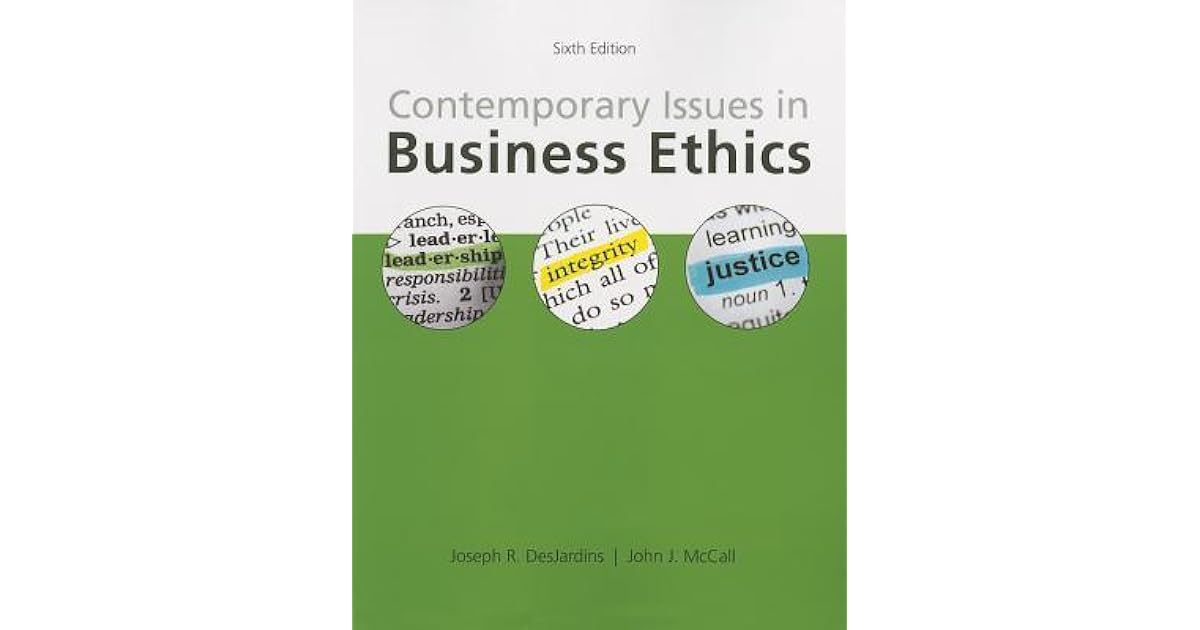An introduction to business ethics joseph desjardins 6th edition – In the ever-evolving landscape of business, ethical decision-making has become paramount. An Introduction to Business Ethics by Joseph Desjardins provides a comprehensive guide to navigating the complex ethical challenges faced by today’s professionals. With its sixth edition, this renowned text offers a fresh perspective on the foundations of business ethics, empowering readers to make informed and responsible choices in the face of ethical dilemmas.
This insightful text delves into the fundamental principles of ethical theory, equipping readers with a solid understanding of the different ethical frameworks that guide decision-making. It explores the challenges and complexities of ethical decision-making in the business world, emphasizing the role of stakeholders and the importance of ethical leadership.
Overview of Business Ethics
Business ethics refers to the moral principles and values that guide the conduct of businesses and their employees. It encompasses the ethical implications of business decisions, policies, and practices.
Business ethics is essential for several reasons. First, it ensures that businesses operate in a responsible and socially acceptable manner. Second, it protects the interests of stakeholders, such as customers, employees, and shareholders. Third, it promotes trust and confidence in businesses, which is essential for long-term success.
However, business ethics can be challenging to implement. This is because businesses often face competing interests and pressures, such as the need to make a profit and the desire to do what is right. Additionally, the ethical landscape is constantly changing, making it difficult for businesses to keep up with the latest developments.
Ethical Theories
There are several different ethical theories that can be used to guide business decisions. Each theory has its own strengths and weaknesses, and the best theory to use will depend on the specific situation.
- Utilitarianismfocuses on maximizing the overall good or happiness. It is a consequentialist theory, meaning that it judges the rightness or wrongness of an action based on its consequences.
- Deontologyfocuses on following moral rules or duties. It is a non-consequentialist theory, meaning that it judges the rightness or wrongness of an action based on its inherent characteristics, not its consequences.
- Virtue ethicsfocuses on developing good character traits. It is a non-consequentialist theory that judges the rightness or wrongness of an action based on the character of the person who performs it.
Ethical Decision-Making: An Introduction To Business Ethics Joseph Desjardins 6th Edition

Ethical decision-making is the process of making decisions that are consistent with ethical principles. It is a complex process that involves several steps.
- Identify the ethical issue.The first step is to identify the ethical issue that is at stake in the decision.
- Gather information.Once the ethical issue has been identified, it is important to gather information about the issue, including the facts of the case and the different perspectives of the stakeholders.
- Identify the ethical principles.The next step is to identify the ethical principles that are relevant to the decision. This may involve consulting with experts in ethics or consulting ethical codes and guidelines.
- Weigh the alternatives.Once the ethical principles have been identified, it is important to weigh the different alternatives and consider the potential consequences of each alternative.
- Make a decision.The final step is to make a decision that is consistent with the ethical principles and the best interests of the stakeholders.
Ethical Issues in Business
There are a number of different ethical issues that can arise in business. These issues can range from relatively minor issues, such as conflicts of interest, to more serious issues, such as fraud and corruption.
- Conflicts of interestoccur when an individual has a personal interest that could interfere with their ability to make objective decisions.
- Fraudis the intentional deception of others for personal gain.
- Corruptionis the use of power or influence to gain an unfair advantage.
Corporate Social Responsibility
Corporate social responsibility (CSR) is the idea that businesses have a responsibility to give back to the communities in which they operate. CSR can take many different forms, such as donating money to charity, volunteering, and reducing environmental impact.
CSR is important for several reasons. First, it can help businesses to improve their reputation and build trust with customers and stakeholders. Second, it can help businesses to attract and retain employees. Third, it can help businesses to reduce their risk of legal and regulatory problems.
However, CSR can also be challenging to implement. This is because businesses often face competing interests and pressures, such as the need to make a profit and the desire to do what is right.
Conclusion
An Introduction to Business Ethics by Joseph Desjardins serves as an invaluable resource for students, business professionals, and anyone seeking to navigate the ethical complexities of modern business practices. Through its engaging narrative and practical insights, this book empowers readers to make ethical decisions that align with both personal values and organizational goals, fostering a more responsible and sustainable business environment.
Frequently Asked Questions
What is the primary focus of An Introduction to Business Ethics by Joseph Desjardins?
The primary focus of this book is to provide a comprehensive guide to ethical decision-making in the business world, exploring ethical theories, challenges, and practical applications.
How does the book approach ethical decision-making?
The book adopts a step-by-step approach to ethical decision-making, emphasizing the role of stakeholders, ethical leadership, and the consideration of ethical theories.
What are the key ethical issues addressed in the book?
The book covers a wide range of ethical issues in business, including corporate social responsibility, environmental sustainability, workplace diversity, and ethical marketing practices.